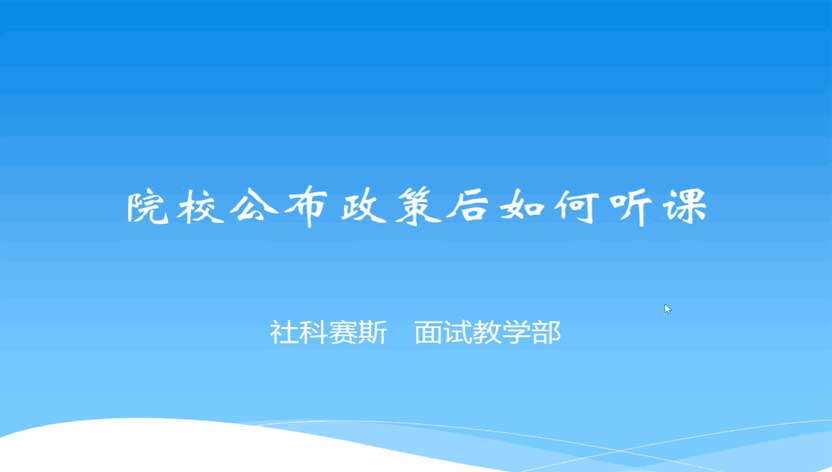2025MBA報考測評申請中......
說明:您只需填寫姓名和電話即可免費預約!也可以通過撥打熱線免費預約
我們的工作人員會在最短時間內給予您活動安排回復。
導讀:
距離考研還有將近四十天時間,對于英語備考來說,還是要研究真題,對于做過的題目現在正是梳理的好時候,這一過程是個承前啟后的關鍵步驟。對于英語閱讀來說,當中出現概率最高的細節題還是需要大家花心思去理解的。
Americans today don’t place a very high value on intellect. Our heroes are athletes, entertainers, and entrepreneurs, not scholars. Even our schools are where we send our children to get a practical education -- not to pursue knowledge for the sake of knowledge. Symptoms of pervasive anti-intellectualism in our schools aren’t difficult to find。
“Schools have always been in a society where practical is more important than intellectual,” says education writer Diane Ravitch. “Schools could be a counterbalance。” Ravitch’s latest book, Left Back: A Century of Failed School Reforms, traces the roots of anti-intellectualism in our schools, concluding they are anything but a counterbalance to the American distaste for intellectual pursuits。
But they could and should be. Encouraging kids to reject the life of the mind leaves them vulnerable to exploitation and control. Without the ability to think critically, to defend their ideas and understand the ideas of others, they cannot fully participate in our democracy. Continuing along this path, says writer Earl Shorris, “We will become a second-rate country. We will have a less civil society。”
“Intellect is resented as a form of power or privilege,” writes historian and professor Richard Hofstadter in Anti-Intellectualism in American Life, a Pulitzer-Prize winning book on the roots of anti-intellectualism in US politics, religion, and education. From the beginning of our history, says Hofstadter, our democratic and populist urges have driven us to reject anything that smells of elitism. Practicality, common sense, and native intelligence have been considered more noble qualities than anything you could learn from a book。
Ralph Waldo Emerson and other Transcendentalist philosophers thought schooling and rigorous book learning put unnatural restraints on children: “We are shut up in schools and college recitation rooms for 10 or 15 years and come out at last with a bellyful of words and do not know a thing。” Mark Twain’s Huckleberry Finn exemplified American anti-intellectualism. Its hero avoids being civilized -- going to school and learning to read -- so he can preserve his innate goodness。
Intellect, according to Hofstadter, is different from native intelligence, a quality we reluctantly admire. Intellect is the critical, creative, and contemplative side of the mind. Intelligence seeks to grasp, manipulate, re-order, and adjust, while intellect examines, ponders, wonders, theorizes, criticizes and imagines。
School remains a place where intellect is mistrusted. Hofstadter says our country’s educational system is in the grips of people who “joyfully and militantly proclaim their hostility to intellect and their eagerness to identify with children who show the least intellectual promise。”
56.What do American parents expect their children to acquire in school?
[A] The habit of thinking independently。
[B] Profound knowledge of the world。
[C] Practical abilities for future career。
[D] The confidence in intellectual pursuits。
57.We can learn from the text that Americans have a history of ________。
[A] undervaluing intellect
[B] favoring intellectualism
[C] supporting school reform
[D] suppressing native intelligence
58.The views of Ravitch and Emerson on schooling are ________。
[A] identical
[B] similar
[C] complementary
[D] opposite
59.Emerson, according to the text, is probably ________。
[A] a pioneer of education reform
[B] an opponent of intellectualism
[C] a scholar in favor of intellect
[D] an advocate of regular schooling
56題根據題干中American parents定位到第一段第二行:Even our schools are where we send our children to get a practical education -- not to pursue knowledge for the sake of knowledge. C.practical abilities for future career。正是對于上一句話的同義替換。
57題根據American have a history定位到第四段第三行,說的是從我們的歷史開始,我們對于民主和大眾主義的渴求促使我們拒絕一切有精英主義色彩的事物。而選項中都沒有和反對精英主義直接相關的選項,需要看下一句是對精英主義的表現:實用的知識、常識、天生的智慧會被認為比書上的一切東西要高貴。在這里需要區分的是intellect和native intelligence,前者指的是后天書本上獲得知識,后者指的是先天的智力。
58需要尋找Ravitch和Emerson所在的句子。Ravitch觀點在第二段第二行“schools could be a counterbalance。”聯系上一句得知他主張學校應該重視知識而不是隨社會的大流。Emerson的觀點在第五段第二行“schooling and rigorous book learning put unnatural restraints an children。”兩人觀點一個希望學校多重視知識;另一個不應該多教知識。因此選的是相反的觀點。
59根據Emerson定位到第五段第二行,與58題題目考察知識點重復,其實也可以說是一道態度題,他認為不應該多教知識,因此對應B,而CD是原意的反面。
做好考研英語閱讀細節題,重要的是審題要細致認真,這需要同學們平時練習時多總結積累。最后沖刺階段,大家可以把之前做過的細節題進行梳理,看看自己錯在哪里,把失分點進行歸類,讓自己不再犯類似錯誤。













